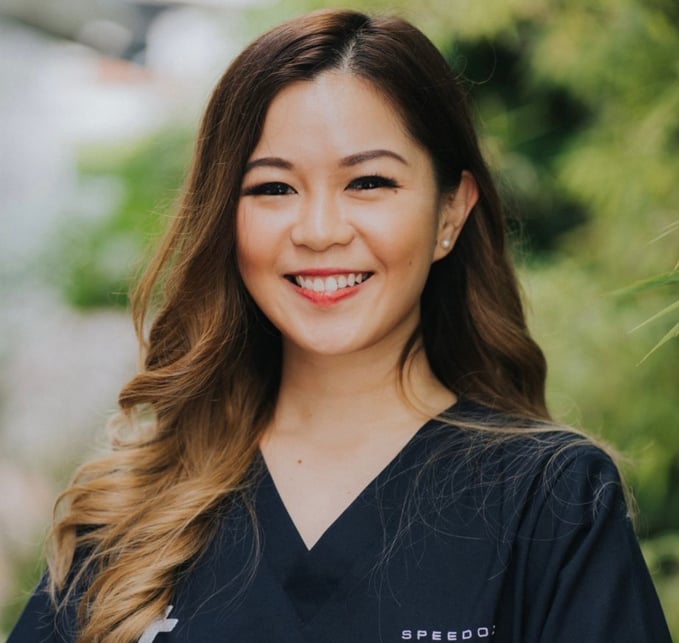Paving the Way for Digital Health with Speedoc Co-founder Serene Cai

COVID-19 has been an enormous catalyst for the rise of digital healthcare worldwide, and Serene Cai, co-founder of Speedoc, one of Singapore’s leading digital health startups, can certainly attest to that. During the pandemic, Cai was instrumental in the uplifting of the healthcare landscape in the region — working with government and hospital partners to create virtual hospitals.
Speedoc played a key role in Singapore’s COVID-19 response — providing medical attention to foreign worker dormitories, performing more than 25,000 swabs, helping more than 18,000 seafarers with flight certifications return home, and administering swabs to those who were housebound. Since then, Speedoc has successfully discharged more than 4,000 patients from its virtual ward program.
We spoke with Serene to learn about her professional career, her experience founding and managing a startup, and how Speedoc differentiates from other telemedicine companies.
Where the interest in healthcare began
HubSpot for Startups: How did your corporate communications studies lead to an interest in healthcare?
Serene: I majored in advertising and PR at the Wee Kim Wee School of Communication and Information and moved into corporate communications after graduation.
My communications training exposed me to important digital trends like on-demand services and the plight of underserved communities, which prompted my career in health tech and the founding of Speedoc to increase accessibility and affordability of healthcare.
HSFS: What have been some of the highlights and milestones of your professional career?
Serene: One of the greatest highlights of my professional career was playing a role in the nation’s COVID-19 response. I will never forget when I looked at the statistics in the newspapers and the sense of duty hit me for the first time. It had dawned on me that the days of being “just” an entrepreneur were over, and at that moment I was a healthcare leader staring down what had just become a global pandemic.
Thankfully, many of us in the industry banded together and worked tirelessly day and night to keep the outbreak under control. Now that we’ve moved into the endemic phase of the pandemic, I still maintain firm friendships with the people that I worked closely with during those two years.
Overcoming challenges
HSFS: What have been some of the biggest challenges in your career and how did you overcome them?
Serene: The biggest challenge is that the challenges never stop coming! These could be anything from people and patient management, managing a wider network of stakeholders such as our investors and partners, to potentially life-or-death scenarios. But every day, the knowledge that we are contributing to making a change in people's lives motivates me to take on any challenges, come what may.
In the small pockets of time (amidst the many day-to-day priorities to be managed), I get to reflect on Speedoc’s growth, and I think of the progress we have made from its inception as a two-man team, to how we are diligently affecting change across several cities in Southeast Asia today. It's an incredibly rewarding feeling, and I feel fortunate to be able to do this work every day.
The origins of Speedoc
HSFS: How did you initially become acquainted with Dr. Shravan Verma and become a co-founder of Speedoc?
Serene: Dr. Shravan and I met at a startup event early in 2017. We bonded over the strong sense of mission we felt to push the boundaries of the local traditional healthcare industry, to improve the quality of care and the overall patient experience. We identified an underserved market of patients who were seeking medical care in emergency departments, but whose conditions could be treated in the community.
I was also spurred on by my own prior experiences caring for my loved ones — to find simpler ways for those in need to seek medical health. Dr. Shravan and I both decided that the idea of an app for on-demand medical services could address the gaps we identified, even if it was just the two of us managing everything at the start.
HSFS: What did the process of finding and securing investors for Speedoc entail?
Serene: In 2020, Speedoc raised $6.7 million in a Series A funding round led by Vertex Ventures; and in 2022, raised a further S$28 million in a pre-Series B funding to expand its virtual home care program.
We were very fortunate that the investors that are on board with us identify with our mission to push the boundaries of healthcare and share in our vision to make healthcare services accessible across Asia.
Being able to secure funding from both new and existing investors is a testament to what Speedoc has and continues to accomplish. It is also a sign of investor confidence in our unique approach and what Speedoc does to bring hospital-level care to homes across Southeast Asia.
The challenges of managing a startup
HSFS: How does managing a startup compare to other work experiences you’ve had?
Serene: It certainly is very different from the other experiences I’ve had in my past life. To say it has been a challenging journey is an understatement.
When Speedoc was first launched, just Dr. Shravan and I had to do everything ourselves — from tending to patients, establishing investor relationships, managing marketing and business development, and building up our partners base, to managing our finances and accounting. At one time, I was even the designated driver driving our doctors for house visits!
It was also a steep learning curve for me as I was from the communications and advertising industry prior and almost everything had to be picked up from scratch. I had to quickly build up my knowledge of the medical domain — from learning what the different medical terms and jargon meant, to what different medical equipment did, to understanding how various conditions are treated. Because of the initial unfamiliarity, I believe I’ve had to work doubly hard to prove myself. Fortunately, I had a great support system and I took each day as a challenge and in my stride.
HSFS: What has been the most challenging part of managing a startup and what has been the most rewarding aspect?
Serene: I often remarked when asked, that the most challenging part of managing a startup or delving into entrepreneurship, is not the hustle or the struggle for growth. In my view, when there are things to be done or milestones to achieve, one is galvanized into action.
It’s the slow, daily work that contributes to building something bigger that is the hardest and takes the most discipline. The impact of the daily work may be hard to measure, but the everyday discipline and focus is an important way of ensuring the startup can grow properly and add value to the stakeholders — as we have set out to do.
On a personal note, what drives me to push through the grind every day, is knowing the impact I am making on those around me and the part I play in making our community better as a whole. I rarely get many opportunities to ponder about my motivations, but occasionally when I receive texts from my loved ones about how their loved ones are better off because of the medical help they were able to access, I am reminded of the opportunity I have to make a difference in someone’s life.
What makes Speedoc unique
HSFS: How does Speedoc differentiate from other telemedicine platforms?
Serene: There are many telehealth and telemedicine providers in the market currently and most of these provide basic telehealth services such as teleconsultation, medication delivery, supervised tests, etc.
Speedoc’s key differentiation, however, is that we can safely and efficiently deliver hospital-level healthcare for more complex medical needs that require ongoing review, in homes. These will be for patients with conditions that traditionally required them to be warded — from urgent care management to chronic illnesses. Our solutions can manage conditions such as pneumonia, cellulitis, dengue, heart failure, fluid overload, and urinary tract infections, and the list is still increasing.
Our expertise in tech-enabled decentralized care enables us to provide holistic care to our patients, including frequent medical reviews, round-the-clock nursing, intravenous therapies, frequent blood tests, and in-person visits. This synergy among the varying levels of care and our technologies is a driving force in serving not just primary care, but tertiary-level care within our patients' homes.
HSFS: How have patients in Singapore responded to the telemedicine services you offer?
Serene: We are heartened by the receptivity patients have shown towards the telemedicine and other healthcare services Speedoc offers. The COVID-19 pandemic has been one of the drivers of this receptivity; then, as traditional healthcare facilities faced a manpower crunch, consumers experienced first-hand how telemedicine providers like Speedoc supported nationwide programs like Home Recovery Program, Virtual Ward, and remote supervised ART.
Now that the pandemic is over, we have been observing sustained demand for teleconsultations and telemedicine services since full reopening. As a result of trying them out during the pandemic, we believe consumers enjoy the convenience and ease of access to telehealth services and will continue to do so.
In fact, with aging populations, an imminent concern across Asia, we believe the future model of virtual healthcare services will be here to stay.
The future of Speedoc
HSFS: What are your short and long-term goals for Speedoc?
Serene: The initial results of Speedoc’s flagship H-Ward® program have been very encouraging. We have partnered with several hospitals to roll out this virtual hospital concept and have successfully discharged more than 4,000 patients and saved more than 20,000 bed days for the local public healthcare system since the program’s launch in mid-2020. Patients with various conditions, including COVID-19, dengue, pneumonia, and skin infections, have also been successfully treated under H-Ward.
Building on this success, we want to continue to raise awareness and encourage the adoption of virtual hospitals as a viable alternative to physical hospitals and our Speedoc team is consistently fine-tuning the program to make borderless continuity of care a reality.
The signs of a successful entrepreneur
Today, Serene leads a team of 200 in three countries and is working on establishing Singapore’s digital health leadership in the region, with close to 200,000 patients who have used Speedoc's services to date.
She was named on Forbes’ 30 Under 30 Asia list in 2021, one of TechNode Global’s Southeast Asia’s top 50 rising Women in Tech 2021, and was listed under Edge 35 Under 35 list in 2021. She also received the Emerging Star Award at the Wee Kim Wee School of Communication and Information’s Spotlight Awards 2021 and was conferred the Nanyang Outstanding Young Alumni Award by NTU in 2022.
Speedoc was named a top winner of the OCBC Emerging Enterprise Awards 2022 and was listed in the J.P. Morgan Asia Pacific Top 100 Women-Powered, High-Growth Businesses Report.
We asked Serene what advice she would give fellow entrepreneurs interested in founding a company.

About HubSpot for Startups
HubSpot for Startups provides founders with resources they need to grow and scale their companies. Startups can apply though over 4,000 partnering organizations to save up to 90% on their first year of paid HubSpot service, plus up to 30% off ongoing!
